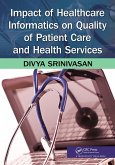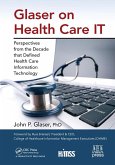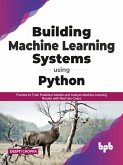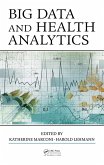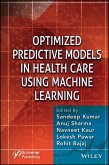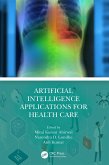Optimized Predictive Models in Health Care Using Machine Learning (eBook, ePUB)
Redaktion: Kumar, Sandeep; Bajaj, Rohit; Pawar, Lokesh; Kaur, Navneet; Sharma, Anuj


Alle Infos zum eBook verschenken

Optimized Predictive Models in Health Care Using Machine Learning (eBook, ePUB)
Redaktion: Kumar, Sandeep; Bajaj, Rohit; Pawar, Lokesh; Kaur, Navneet; Sharma, Anuj
- Format: ePub
- Merkliste
- Auf die Merkliste
- Bewerten Bewerten
- Teilen
- Produkt teilen
- Produkterinnerung
- Produkterinnerung

Hier können Sie sich einloggen

Bitte loggen Sie sich zunächst in Ihr Kundenkonto ein oder registrieren Sie sich bei bücher.de, um das eBook-Abo tolino select nutzen zu können.
OPTIMIZED PREDICTIVE MODELS IN HEALTH CARE USING MACHINE LEARNING This book is a comprehensive guide to developing and implementing optimized predictive models in healthcare using machine learning and is a required resource for researchers, healthcare professionals, and students who wish to know more about real-time applications. The book focuses on how humans and computers interact to ever-increasing levels of complexity and simplicity and provides content on the theory of optimized predictive model design, evaluation, and user diversity. Predictive modeling, a field of machine learning, has…mehr
- Geräte: eReader
- mit Kopierschutz
- eBook Hilfe
- Größe: 5.23MB
![Impact of Healthcare Informatics on Quality of Patient Care and Health Services (eBook, ePUB) Impact of Healthcare Informatics on Quality of Patient Care and Health Services (eBook, ePUB)]() Divya Srinivasan SridharImpact of Healthcare Informatics on Quality of Patient Care and Health Services (eBook, ePUB)54,95 €
Divya Srinivasan SridharImpact of Healthcare Informatics on Quality of Patient Care and Health Services (eBook, ePUB)54,95 €![Glaser on Health Care IT (eBook, ePUB) Glaser on Health Care IT (eBook, ePUB)]() John P. GlaserGlaser on Health Care IT (eBook, ePUB)35,95 €
John P. GlaserGlaser on Health Care IT (eBook, ePUB)35,95 €![Building Machine Learning Systems Using Python: Practice to Train Predictive Models and Analyze Machine Learning Results with Real Use-Cases (English Edition) (eBook, ePUB) Building Machine Learning Systems Using Python: Practice to Train Predictive Models and Analyze Machine Learning Results with Real Use-Cases (English Edition) (eBook, ePUB)]() Deepti ChopraBuilding Machine Learning Systems Using Python: Practice to Train Predictive Models and Analyze Machine Learning Results with Real Use-Cases (English Edition) (eBook, ePUB)8,49 €
Deepti ChopraBuilding Machine Learning Systems Using Python: Practice to Train Predictive Models and Analyze Machine Learning Results with Real Use-Cases (English Edition) (eBook, ePUB)8,49 €![Big Data and Health Analytics (eBook, ePUB) Big Data and Health Analytics (eBook, ePUB)]() Big Data and Health Analytics (eBook, ePUB)54,95 €
Big Data and Health Analytics (eBook, ePUB)54,95 €![Optimized Predictive Models in Health Care Using Machine Learning (eBook, PDF) Optimized Predictive Models in Health Care Using Machine Learning (eBook, PDF)]() Optimized Predictive Models in Health Care Using Machine Learning (eBook, PDF)150,99 €
Optimized Predictive Models in Health Care Using Machine Learning (eBook, PDF)150,99 €![Artificial Intelligence Applications for Health Care (eBook, ePUB) Artificial Intelligence Applications for Health Care (eBook, ePUB)]() Mitul Kumar AhirwalArtificial Intelligence Applications for Health Care (eBook, ePUB)46,95 €
Mitul Kumar AhirwalArtificial Intelligence Applications for Health Care (eBook, ePUB)46,95 €![Data Science Project Ideas in Health Care (eBook, ePUB) Data Science Project Ideas in Health Care (eBook, ePUB)]() Zemelak GoragaData Science Project Ideas in Health Care (eBook, ePUB)18,99 €
Zemelak GoragaData Science Project Ideas in Health Care (eBook, ePUB)18,99 €-
-
-
Dieser Download kann aus rechtlichen Gründen nur mit Rechnungsadresse in A, B, BG, CY, CZ, D, DK, EW, E, FIN, F, GR, HR, H, IRL, I, LT, L, LR, M, NL, PL, P, R, S, SLO, SK ausgeliefert werden.
Hinweis: Dieser Artikel kann nur an eine deutsche Lieferadresse ausgeliefert werden.
- Produktdetails
- Verlag: John Wiley & Sons
- Seitenzahl: 384
- Erscheinungstermin: 8. Februar 2024
- Englisch
- ISBN-13: 9781394175352
- Artikelnr.: 70057482
- Verlag: John Wiley & Sons
- Seitenzahl: 384
- Erscheinungstermin: 8. Februar 2024
- Englisch
- ISBN-13: 9781394175352
- Artikelnr.: 70057482
- Herstellerkennzeichnung Die Herstellerinformationen sind derzeit nicht verfügbar.
1 Impact of Technology on Daily Food Habits and Their Effects on Health 1
Neha Tanwar, Sandeep Kumar and Shilpa Choudhary
1.1 Introduction 2
1.2 Technologies, Foodies, and Consciousness 4
1.3 Government Programs to Encourage Healthy Choices 7
1.4 Technology's Impact on Our Food Consumption 7
1.5 Customized Food is the Future of Food 8
1.6 Impact of Food Technology and Innovation on Nutrition and Health 9
1.7 Top Prominent and Emerging Food Technology Trends 10
1.8 Discussion 18
1.9 Conclusions 18
2 Issues in Healthcare and the Role of Machine Learning in Healthcare 21
Nidhika Chauhan, Navneet Kaur, Kamaljit Singh Saini and Manjot Kaur
2.1 Introduction 22
2.2 Issues in Healthcare 23
2.3 Factors Affecting the Health 30
2.4 Machine Learning in Healthcare 30
2.5 Conclusion 32
3 Improving Accuracy in Predicting Stress Levels of Working Women Using
Convolutional Neural Networks 39
Purude Vaishali Narayanro, Regula Srilakshmi, M. Deepika and P. Lalitha
Surya Kumari
3.1 Introduction 39
3.2 Literature Survey 41
3.3 Proposed Methodology 45
3.4 Result and Discussion 50
3.5 Conclusion and Future Scope 54
4 Analysis of Smart Technologies in Healthcare 57
Shikha Jain, Navneet Kaur, Manisha Malhotra and Manjot Kaur
4.1 Introduction 57
4.2 Emerging Technologies in Healthcare 58
4.3 Literature Review 62
4.4 Risks and Challenges 65
4.5 Conclusion 68
5 Enhanced Neural Network Ensemble Classification for the Diagnosis of Lung
Cancer Disease 73
Thaventhiran Chandrasekar, Praveen Kumar Karunanithi, K.R. Sekar and Arka
Ghosh
5.1 Introduction 74
5.2 Algorithm for Classification of Proposed Weight-Optimized Neural
Network Ensembles 75
5.3 Experimental Work and Results 81
5.4 Conclusion 84
6 Feature Selection for Breast Cancer Detection 89
Kishan Sharda, Mandeep Singh Ramdev, Deepak Rawat and Pawan Bishnoi
6.1 Introduction 90
6.2 Literature Review 92
6.3 Design and Implementation 94
6.4 Conclusion 100
7 An Optimized Feature-Based Prediction Model for Grouping the Liver
Patients 103
Bhupender Yadav and Rohit Bajaj
7.1 Introduction 104
7.2 Literature Review 106
7.3 Proposed Methodology 108
7.4 Results and Discussions 108
7.5 Conclusion 113
8 A Robust Machine Learning Model for Breast Cancer Prediction 117
Rachna, Chahil Choudhary and Jatin Thakur
8.1 Introduction 118
8.2 Literature Review 119
8.3 Proposed Mythology 126
8.4 Result and Discussion 127
8.5 Concluding Remarks and Future Scope 132
9 Revolutionizing Pneumonia Diagnosis and Prediction Through Deep Neural
Networks 135
Abhishek Bhola and Monali Gulhane
9.1 Introduction 135
9.2 Literature Work 138
9.3 Proposed Section 139
9.4 Result Analysis 142
9.5 Conclusion and Future Scope 146
10 Optimizing Prediction of Liver Disease Using Machine Learning Algorithms
151
Rachna, Tanish Jain, Deepak Shandilya and Shivangi Gagneja
10.1 Introduction 151
10.2 Related Works 153
10.3 Proposed Methodology 166
10.4 Result and Discussions 166
10.5 Conclusion 170
11 Optimized Ensembled Model to Predict Diabetes Using Machine Learning 173
Kamal, AnujKumar Sharma and Dinesh Kumar
11.1 Introduction 173
11.2 Literature Review 175
11.3 Proposed Methodology 177
11.4 Results and Discussion 184
11.5 Concluding Remarks and Future Scope 187
12 Wearable Gait Authentication: A Framework for Secure User Identification
in Healthcare 195
Swathi A., Swathi V., Shilpa Choudhary and Munish Kumar
12.1 Introduction 195
12.2 Literature Survey 197
12.3 Proposed System 199
12.4 Results and Discussion 203
12.5 Conclusion and Future Scope 211
13 NLP-Based Speech Analysis Using K-Neighbor Classifier 215
Renuka Arora and Rishu Bhatia
13.1 Introduction 215
13.2 Supervised Machine Learning for NLP and Text Analytics 216
13.3 Unsupervised Machine Learning for NLP and Text Analytics 219
13.4 Experiments and Results 222
13.5 Conclusion 225
14 Fusion of Various Machine Learning Algorithms for Early Heart Attack
Prediction 229
Monali Gulhane and Sandeep Kumar
14.1 Introduction 230
14.2 Literature Review 231
14.3 Materials and Methods 233
14.4 Result Analysis 239
14.5 Conclusion 242
15 Machine Learning-Based Approaches for Improving Healthcare Services and
Quality of Life (QoL): Opportunities, Issues and Challenges 245
Pankaj Rahi, Rohit Bajaj, Sanjay P. Sood, Monika Dandotiyan and A. Anushya
15.1 Introduction 246
15.2 Core Areas of Deep Learning and ML-Modeling in Medical Healthcare 248
15.3 Use Cases of Machine Learning Modelling in Healthcare Informatics 250
15.4 Improving the Quality of Services During the Diagnosing and Treatment
Processes of Chronicle Diseases 259
15.5 Limitations and Challenges of ML, DL Modelling in Healthcare Systems
261
15.6 Conclusion 264
16 Developing a Cognitive Learning and Intelligent Data Analysis-Based
Framework for Early Disease Detection and Prevention in Younger Adults with
Fatigue 273
Harish Padmanaban P. C. and Yogesh Kumar Sharma
16.1 Introduction 274
16.2 Proposed Framework "Cognitive-Intelligent Fatigue Detection and
Prevention Framework (CIFDPF)" 275
16.3 Potential Impact 286
16.4 Discussion and Limitations 292
16.5 Future Work 293
16.6 Conclusion 294
17 Machine Learning Approach to Predicting Reliability in Healthcare Using
Knowledge Engineering 299
Kialakun N. Galgal, Kamalakanta Muduli and Ashish Kumar Luhach
17.1 Introduction 300
17.2 Literature Review 302
17.3 Proposed Methodology 305
17.4 Implications 310
17.5 Conclusion 312
17.6 Limitations and Scope of Future Work 313
18 TPLSTM-Based Deep ANN with Feature Matching Prediction of Lung Cancer
317
Thaventhiran Chandrasekar, Praveen Kumar Karunanithi, A. Emily Jenifer and
Inti Dhiraj
18.1 Introduction 318
18.2 Proposed TP-LSTM-Based Neural Network with Feature Matching for
Prediction of Lung Cancer 320
18.3 Experimental Work and Comparison Analysis 325
18.4 Conclusion 326
19 Analysis of Business Intelligence in Healthcare Using Machine Learning
329
Vipin Kumar, Chelsi Sen, Arpit Jain, Abhishek Jain and Anu Sharma
19.1 Introduction 329
19.2 Data Gathering 331
19.3 Literature Review 333
19.4 Research Methodology 334
19.5 Implementation 335
19.6 Eligibility Criteria 337
19.7 Results 337
19.8 Conclusion and Future Scope 338
20 StressDetect: ML for Mental Stress Prediction 341
Himanshu Verma, Nimish Kumar, Yogesh Kumar Sharma and Pankaj Vyas
20.1 Introduction 342
20.2 Related Work 344
20.3 Materials and Methods 348
20.4 Results 352
20.5 Discussion & Conclusions 353
References 355
Index 359
1 Impact of Technology on Daily Food Habits and Their Effects on Health 1
Neha Tanwar, Sandeep Kumar and Shilpa Choudhary
1.1 Introduction 2
1.2 Technologies, Foodies, and Consciousness 4
1.3 Government Programs to Encourage Healthy Choices 7
1.4 Technology's Impact on Our Food Consumption 7
1.5 Customized Food is the Future of Food 8
1.6 Impact of Food Technology and Innovation on Nutrition and Health 9
1.7 Top Prominent and Emerging Food Technology Trends 10
1.8 Discussion 18
1.9 Conclusions 18
2 Issues in Healthcare and the Role of Machine Learning in Healthcare 21
Nidhika Chauhan, Navneet Kaur, Kamaljit Singh Saini and Manjot Kaur
2.1 Introduction 22
2.2 Issues in Healthcare 23
2.3 Factors Affecting the Health 30
2.4 Machine Learning in Healthcare 30
2.5 Conclusion 32
3 Improving Accuracy in Predicting Stress Levels of Working Women Using
Convolutional Neural Networks 39
Purude Vaishali Narayanro, Regula Srilakshmi, M. Deepika and P. Lalitha
Surya Kumari
3.1 Introduction 39
3.2 Literature Survey 41
3.3 Proposed Methodology 45
3.4 Result and Discussion 50
3.5 Conclusion and Future Scope 54
4 Analysis of Smart Technologies in Healthcare 57
Shikha Jain, Navneet Kaur, Manisha Malhotra and Manjot Kaur
4.1 Introduction 57
4.2 Emerging Technologies in Healthcare 58
4.3 Literature Review 62
4.4 Risks and Challenges 65
4.5 Conclusion 68
5 Enhanced Neural Network Ensemble Classification for the Diagnosis of Lung
Cancer Disease 73
Thaventhiran Chandrasekar, Praveen Kumar Karunanithi, K.R. Sekar and Arka
Ghosh
5.1 Introduction 74
5.2 Algorithm for Classification of Proposed Weight-Optimized Neural
Network Ensembles 75
5.3 Experimental Work and Results 81
5.4 Conclusion 84
6 Feature Selection for Breast Cancer Detection 89
Kishan Sharda, Mandeep Singh Ramdev, Deepak Rawat and Pawan Bishnoi
6.1 Introduction 90
6.2 Literature Review 92
6.3 Design and Implementation 94
6.4 Conclusion 100
7 An Optimized Feature-Based Prediction Model for Grouping the Liver
Patients 103
Bhupender Yadav and Rohit Bajaj
7.1 Introduction 104
7.2 Literature Review 106
7.3 Proposed Methodology 108
7.4 Results and Discussions 108
7.5 Conclusion 113
8 A Robust Machine Learning Model for Breast Cancer Prediction 117
Rachna, Chahil Choudhary and Jatin Thakur
8.1 Introduction 118
8.2 Literature Review 119
8.3 Proposed Mythology 126
8.4 Result and Discussion 127
8.5 Concluding Remarks and Future Scope 132
9 Revolutionizing Pneumonia Diagnosis and Prediction Through Deep Neural
Networks 135
Abhishek Bhola and Monali Gulhane
9.1 Introduction 135
9.2 Literature Work 138
9.3 Proposed Section 139
9.4 Result Analysis 142
9.5 Conclusion and Future Scope 146
10 Optimizing Prediction of Liver Disease Using Machine Learning Algorithms
151
Rachna, Tanish Jain, Deepak Shandilya and Shivangi Gagneja
10.1 Introduction 151
10.2 Related Works 153
10.3 Proposed Methodology 166
10.4 Result and Discussions 166
10.5 Conclusion 170
11 Optimized Ensembled Model to Predict Diabetes Using Machine Learning 173
Kamal, AnujKumar Sharma and Dinesh Kumar
11.1 Introduction 173
11.2 Literature Review 175
11.3 Proposed Methodology 177
11.4 Results and Discussion 184
11.5 Concluding Remarks and Future Scope 187
12 Wearable Gait Authentication: A Framework for Secure User Identification
in Healthcare 195
Swathi A., Swathi V., Shilpa Choudhary and Munish Kumar
12.1 Introduction 195
12.2 Literature Survey 197
12.3 Proposed System 199
12.4 Results and Discussion 203
12.5 Conclusion and Future Scope 211
13 NLP-Based Speech Analysis Using K-Neighbor Classifier 215
Renuka Arora and Rishu Bhatia
13.1 Introduction 215
13.2 Supervised Machine Learning for NLP and Text Analytics 216
13.3 Unsupervised Machine Learning for NLP and Text Analytics 219
13.4 Experiments and Results 222
13.5 Conclusion 225
14 Fusion of Various Machine Learning Algorithms for Early Heart Attack
Prediction 229
Monali Gulhane and Sandeep Kumar
14.1 Introduction 230
14.2 Literature Review 231
14.3 Materials and Methods 233
14.4 Result Analysis 239
14.5 Conclusion 242
15 Machine Learning-Based Approaches for Improving Healthcare Services and
Quality of Life (QoL): Opportunities, Issues and Challenges 245
Pankaj Rahi, Rohit Bajaj, Sanjay P. Sood, Monika Dandotiyan and A. Anushya
15.1 Introduction 246
15.2 Core Areas of Deep Learning and ML-Modeling in Medical Healthcare 248
15.3 Use Cases of Machine Learning Modelling in Healthcare Informatics 250
15.4 Improving the Quality of Services During the Diagnosing and Treatment
Processes of Chronicle Diseases 259
15.5 Limitations and Challenges of ML, DL Modelling in Healthcare Systems
261
15.6 Conclusion 264
16 Developing a Cognitive Learning and Intelligent Data Analysis-Based
Framework for Early Disease Detection and Prevention in Younger Adults with
Fatigue 273
Harish Padmanaban P. C. and Yogesh Kumar Sharma
16.1 Introduction 274
16.2 Proposed Framework "Cognitive-Intelligent Fatigue Detection and
Prevention Framework (CIFDPF)" 275
16.3 Potential Impact 286
16.4 Discussion and Limitations 292
16.5 Future Work 293
16.6 Conclusion 294
17 Machine Learning Approach to Predicting Reliability in Healthcare Using
Knowledge Engineering 299
Kialakun N. Galgal, Kamalakanta Muduli and Ashish Kumar Luhach
17.1 Introduction 300
17.2 Literature Review 302
17.3 Proposed Methodology 305
17.4 Implications 310
17.5 Conclusion 312
17.6 Limitations and Scope of Future Work 313
18 TPLSTM-Based Deep ANN with Feature Matching Prediction of Lung Cancer
317
Thaventhiran Chandrasekar, Praveen Kumar Karunanithi, A. Emily Jenifer and
Inti Dhiraj
18.1 Introduction 318
18.2 Proposed TP-LSTM-Based Neural Network with Feature Matching for
Prediction of Lung Cancer 320
18.3 Experimental Work and Comparison Analysis 325
18.4 Conclusion 326
19 Analysis of Business Intelligence in Healthcare Using Machine Learning
329
Vipin Kumar, Chelsi Sen, Arpit Jain, Abhishek Jain and Anu Sharma
19.1 Introduction 329
19.2 Data Gathering 331
19.3 Literature Review 333
19.4 Research Methodology 334
19.5 Implementation 335
19.6 Eligibility Criteria 337
19.7 Results 337
19.8 Conclusion and Future Scope 338
20 StressDetect: ML for Mental Stress Prediction 341
Himanshu Verma, Nimish Kumar, Yogesh Kumar Sharma and Pankaj Vyas
20.1 Introduction 342
20.2 Related Work 344
20.3 Materials and Methods 348
20.4 Results 352
20.5 Discussion & Conclusions 353
References 355
Index 359

